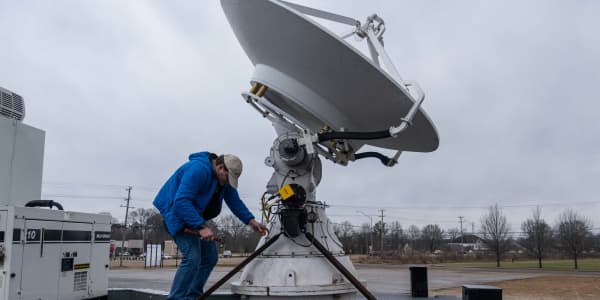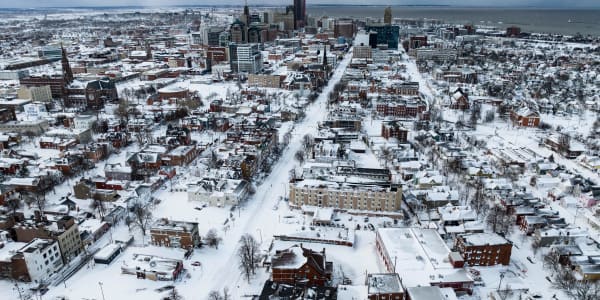America's infrastructure is in a crisis that is escalating considerably faster than the traffic on our clogged and crumbling highways. The Trump administration has begun outlining a $1 trillion infrastructure plan, and infrastructure has taken on increasing importance in this year's America's Top States for Business rankings. The category is worth 400 out of our 2,500 points. Here are the 10 states built to last, boasting the nation's best roads, bridges, railways, ports, airports and utilities.
10. Minnesota
Minnesota is a prime example of how infrastructure is an issue that never goes away. The state received a wake-up call with the deadly 2007 collapse of the St. Anthony Falls Bridge, which carries Interstate 35W over the Mississippi River in Minneapolis. The bridge was replaced just over a year later, and today only a relative handful of the state's bridges are structurally deficient. But needs continue to pile up. Gov. Mark Dayton recently signed a $988 million infrastructure bill. The package had to be scaled back by more than one-third, however, because of concerns about debt.
2017 Infrastructure score: 211 out of 400 points
Deficient bridges: 6 percent
Average commute to work: 23.1 minutes
Major airport: Minneapolis–St. Paul International
20-year water system needs: $7.4 billion
2016 Infrastructure rank: No. 5
9. Utah
The Beehive State has been busy working on its infrastructure, and it shows with some of the best roads and bridges in the nation. But water is becoming a major challenge for Utah. The fast-growing state is also one of America's driest, and that combination is tricky. A state task force appointed by Gov. Gary Herbert is developing a plan to ensure a safe and ample water supply through 2060. The panel is recommending increased conservation, as well as increased funding for several infrastructure projects.
2017 Infrastructure score: 212 out of 400 points
Deficient bridges: 3 percent
Average commute to work: 21.6 minutes
Major airport: Salt Lake City International
20-year water system needs: $3.7 billion
2016 Infrastructure rank: No. 13
8. Nevada
The Silver State is another state trying to keep ahead of rapid growth. So far, it is managing to do so despite setbacks during the Great Recession. Roads and bridges here are among the best in the nation, but Nevada is not sitting on its winnings. Project NEON, 20 years in the making, involves widening 3.7 heavily traveled miles of Interstate 15 in Las Vegas. At a cost of nearly $1 billion, planners say it is the largest public works project in Nevada history.
2017 Infrastructure score: 213 out of 400 points
Deficient bridges: 1.6 percent
Average commute to work: 23.9 minutes
Major airport: McCarran International (Las Vegas)
20-year water system needs: $5.6 billion
2016 Infrastructure rank: No. 11
7. Florida
Florida's large population and rapid growth provide constant challenges for infrastructure planners. They are meeting some but not all of those challenges. While commuting can be tough, roads and bridges are among the best maintained in the nation. Ports and airports are meeting the needs of a state that is a gateway to Latin America and the world. But Florida faces a growing water crisis, including saltwater intrusion into the state's freshwater supply. Also a major concern: the effects of climate change on some 1,200 miles of Florida coastline and beyond.
2017 Infrastructure score: 217 out of 400 points
Deficient bridges: 2.1 percent
Average commute to work: 26.4 minutes
Major airports: Miami International, Orlando International
20-year water system needs: $16.5 billion
2016 Infrastructure rank: No. 10
6. Kentucky
Don't let the Bluegrass fool you. Kentucky is bustling with activity. Traffic moves well on Kentucky's well-maintained roads, though the bridges could use some attention. The state is home to an important port on the Ohio River. And to keep that river traffic flowing, the U.S. Army Corp of Engineers is hard at work on the $3 billion Olmsted Lock and Dam project, billed as the most expensive inland waterway project in U.S. history. The $3 billion project aims to clear bottlenecks near the confluence of the Ohio and Mississippi rivers, and that will benefit Western Kentucky.
2017 Infrastructure score: 221 out of 400 points
Deficient bridges: 8.1 percent
Average commute to work: 23 minutes
Major airports: Cincinnati/Northern Kentucky International, Louisville International
20-year water system needs: $6.2 billion
2016 Infrastructure rank: No. 14
5. Ohio
There is a reason President Donald Trump traveled to Cincinnati to launch his push for a national infrastructure program. Ohio is plagued by the same river bottlenecks that neighboring Kentucky is. But there is a lot that is right with Ohio's infrastructure, which moves massive quantities of goods every day. With major inland ports on both the Ohio River and the Great Lakes, and busy rail and highway networks, the Buckeye State is on the move. A major infrastructure challenge not addressed during the president's visit: the growing price tag to fix the state's aging drinking water and wastewater systems.
2017 Infrastructure score: 224 out of 400 points
Deficient bridges: 6.9 percent
Average commute to work: 23.2 minutes
Major airport: Cleveland Hopkins International
20-year water system needs: $12.2 billion
2016 Infrastructure rank: No. 7
4. Georgia
Atlanta gets a lot of grief for the number of streets with "Peachtree" in the name (the most often-cited count is 71), but that's just a minor quirk in a state with an otherwise superb infrastructure. Georgia's roads are among the best in the nation, though the state loses some points for the traffic. Bridges are in excellent shape. And the infrastructure for vehicles is just the start. Atlanta's Hartsfield-Jackson International Airport is the nation's busiest. And Georgia's ports account for 369,000 jobs and more than $84 billion in annual revenue.
2017 Infrastructure store: 230 out of 400 points
Deficient bridges: 4.7 percent
Average commute to work: 27.4 minutes
Major airport: Hartsfield-Jackson International
20-year water system needs: $9.3 billion
2016 Infrastructure rank: No. 4
3. Indiana
When then-candidate Donald Trump introduced Indiana Gov. Mike Pence as his running mate in 2016, he pointed to Indiana's top Infrastructure rating in our study, unveiled the day before. Indiana does not repeat as No. 1 this year but still earns its nickname: The Crossroads of America. A Southern extension of Interstate 69 — a public-private partnership championed by Pence — has been plagued with overruns and other issues, but overall, Indiana's roads are the best in the nation. With major ports on Lake Michigan and the Ohio River and a robust rail network, Indiana is well equipped to get goods where they need to be. But in a state of 6.6 million people with only one direct international flight (to Cancun), the availability of air travel needs improvement.
2017 Infrastructure score: 237 out of 400 points
Deficient bridges: 8 percent
Average commute to work: 23.3 minutes
Major airport: Indianapolis International
20-year water system needs: $6.5 billion
2016 Infrastructure rank: No. 1
2. Tennessee
The Tennessee Valley Authority — formed during the Great Depression to provide power, flood control and economic development assistance for Tennessee and six other southeastern states — serves 9 million people and is a model for public works management. But the Volunteer State is doing plenty on its own to help its infrastructure. The state's IMPROVE Act, just signed into law by Gov. Bill Haslam, relies on gasoline taxes and user fees to fund nearly a thousand highway projects, while ultimately cutting state and local taxes by $500 million a year.
2017 Infrastructure score: 242 out of 400 points
Deficient bridges: 5 percent
Average commute to work: 24.5 minutes
Major airports: Memphis International, Nashville International
20-year water needs: $2.7 billion
2016 Infrastructure rank: No. 2 (tied with Texas)
1. Texas
No state ships more goods to more places than Texas. The Port of Houston is the largest on the Gulf Coast — one of the largest in North America — handling 35 million short tons of cargo last year. Its two major international airports are among the nation's busiest, and the state's freight rail network is in the top five in the nation for tons carried. Yet with all that, and an extensive highway network crisscrossing the state's 268,000 square miles, Texas does a remarkably good job maintaining it all. There are issues. With minimal public transportation, commuting times can be frustratingly long. And the price tag to fix the sprawling state's water systems is daunting. They say everything is big in Texas — that includes the problems and the solutions.
2017 Infrastructure score: 251 out of 400 points
Deficient bridges: 1.7 percent
Average commute to work: 25.6 minutes
Major airports: Dallas–Fort Worth International, Houston George Bush Intercontinental
20-year water needs: $33.9 billion
2016 Infrastructure rank: No. 2 (tied with Tennessee)






